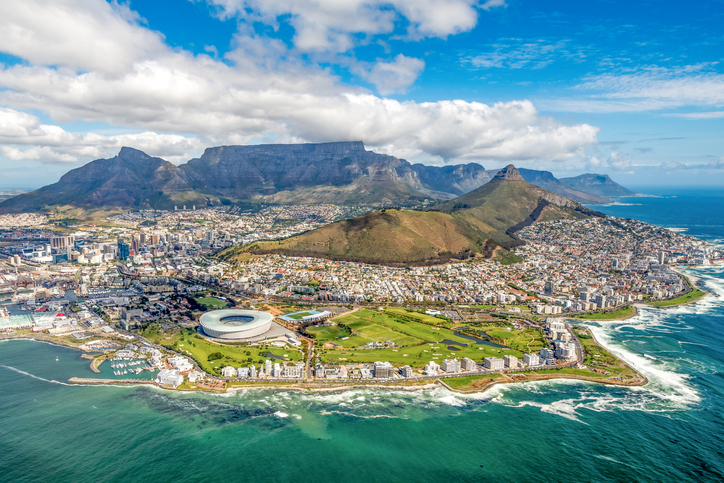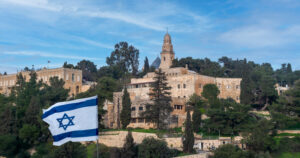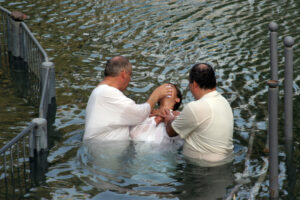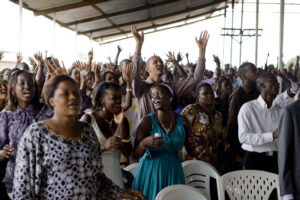
Though founded in the American Midwest, the Zionist church is now a predominately South African congregation which practices spiritual healing and abstinence. Drawing similarities to Pentecostal and Charismatic worshippers, the Zionist church is the largest Christian faith in Africa. In addition to South Africa, the Zion Christian Church has congregations in Lesotho, Malawi, Botswana, Mozambique, Namibia, Eswatini, Zimbabwe, and Zambia.
Given the size of the Zionist movement, the practices and beliefs vary across congregations, though several commonalities exist. You’ll find echoes of the Charismatic movement with the heart of Evangelism – both of which are mixed with traditional African rites.
The Zionist Faith Shouldn’t Be Confused with the Christian Zionist Movement
 The term “Zionist” is often used to describe Christian Zionism, a cultural offshoot of Evangelism. Those adhering to Christian Zionism express support for the state of Israel, allying themselves with Jews across the world.
The term “Zionist” is often used to describe Christian Zionism, a cultural offshoot of Evangelism. Those adhering to Christian Zionism express support for the state of Israel, allying themselves with Jews across the world.
Explore a Christian Ministry Degree – Request More Info Today!
For these and other reasons, Christian Zionism is regarded as much a political movement as it is a religious movement.
What Do Zionist Churches Believe?
 Let’s start with the basics. First, the Zion Christian Church practices immersion as a form of baptism. Choral song and drumbeats often accompany these baptisms, celebrating the worshipper’s acceptance of Christ. This celebration isn’t unique to baptisms, either: the African spirit is found in all manner of worship in a Zion congregation. Singing, dancing, clapping, and drumming emanates from worshippers dressed in bright, rich colors.
Let’s start with the basics. First, the Zion Christian Church practices immersion as a form of baptism. Choral song and drumbeats often accompany these baptisms, celebrating the worshipper’s acceptance of Christ. This celebration isn’t unique to baptisms, either: the African spirit is found in all manner of worship in a Zion congregation. Singing, dancing, clapping, and drumming emanates from worshippers dressed in bright, rich colors.
Those colors aren’t worn at random, either. Members of the Zion Christian Church wear particular garb based on the type of service, their gender, and age. For example, men of all ages wear green suits for Sunday worship. In contrast, young women and girls adorn blue uniforms, but elder women wear green and yellow garb.
A major event among Zion Churchgoers is the pilgrimage to Moria, which occurs every Easter. Millions of Zion Christian Church members travel to the foothills of the mountain just outside Polokwane, a city in northeast South Africa, to celebrate Christ’s rise.
With regard to lifestyle, most Zionists abstain from consuming alcohol, pork, and tobacco. This abstinence is an effort to lead a more “holy” life. In addition, these worshippers denounce those engaging in violence and sexual promiscuity. These practices descend from John Alexander Dowie’s laws for those living in Zion, Illinois.
Aside from the practices listed above, little is known about the Zion Church’s doctrines. It is a somewhat secretive culture. Partly due to the oppression blacks suffered under South African apartheid, the church is wary of discussing its theology with journalists and scholars.
The Practice of Healing in the Church Is Complex, and Connected with African Ancestry
 Faith healing in the Zion Christian Church is somewhat dissimilar from American Charismatic practices. In many African traditional religions, a sort of medium communes with the spiritual world in order to cure physical ailments. In addition, the mediator’s relationship with the spirit world will have a direct impact on that mediator’s community. Will crops flourish or wither? Will an economy grow or contract?
Faith healing in the Zion Christian Church is somewhat dissimilar from American Charismatic practices. In many African traditional religions, a sort of medium communes with the spiritual world in order to cure physical ailments. In addition, the mediator’s relationship with the spirit world will have a direct impact on that mediator’s community. Will crops flourish or wither? Will an economy grow or contract?
This African influence drives the focus of the Zion Christian Church toward “overcoming afflictions in this world,” as described by the World Religions and Spirituality Project. The officers of the ZCC – which are quite similar to those in the Apostolic faith – see sin as a digression from the will of the spirit world (specifically, God). As such, it is their duty to draw sinners from temptation, and to instruct followers in how a holy life will protect them from evil spirits.
The bishops – the appointed leaders of the Christian Zion Church – facilitate protection from evil by listening to confessions. They believe that confession is a pathway to healing from any affliction.
The History of the Zionist Church
Zionist churches can trace their roots back to the city of Zion, Illinois. Founded by John Alexander Dowie, the city served as the base of his Christian Catholic Church. The Christian Catholic Church placed great importance on spiritual healing and holy living.
Dowie was an evangelist and faith healer, amassing thousands of followers in the late 19th century. His use of faith healing drew the ire of doctors and clergyman alike, all of whom filed lawsuits against the evangelist. Dowie not only won most of these litigious battles, but also amassed thousands of followers.
Dowie took his followers to a place 40 miles north of Chicago, establishing the town of Zion. In Dowie’s vision, Zion would embody the values within his Christian Catholic Church. Naming himself as the town’s theocratic ruler, Dowie forbade drinking, smoking, physicians’ offices, dance halls, theaters, and drug stores.
Missions spread out from Zion across the world. Many of Dowie’s African American followers led missions throughout Africa. Thus, the Christian Catholic Church placed roots throughout the continent.
Over time, the theologies of African worshippers and U.S. missionaries diverged. The former believed in the Baptism of the Holy Spirit, while the latter only believed in immersion. The Africans integrated this belief into the Christian Catholic Church’s embrace of divine healing and the Second Coming of Christ. As such, the Zion Apostolic Church was born.
In 1924, Joseph Engenas Matlhakanye Lekganyane, established the Zion Christian Church, an offshoot of the Zion Apostolic Faith Mission, which originated from Dowie’s congregation in Illinois. The movement grew dramatically throughout the first half of the 20th century. According to South African History Online, there are between two million and six million Zion Christians throughout Africa today.
What Would You See at a Zion Christian Church Service?
 Assuming you’re from the U.S., the Zion Christian Church’s style of worship will look much different than a congregation you’d see in Missouri or Alabama. Although it contains the same zeal and fervor as many Charismatic congregations, it is distinctly African in its celebration.
Assuming you’re from the U.S., the Zion Christian Church’s style of worship will look much different than a congregation you’d see in Missouri or Alabama. Although it contains the same zeal and fervor as many Charismatic congregations, it is distinctly African in its celebration.
First, few Zion Christian Church services take place in traditional facilities. Open air worship is common, and you’re more likely to see congregations in homes or school classrooms than in church buildings.
As congregants enter the service, members are sprinkled with water. This rite is thought to cleanse members before entering a place of worship. Then, the Mokhukhu and female choirs perform in the open air. An all-male organization within the Zion Christian Church, the Mokhukhu mirrors a tradition among Bapedi tribes, which facilitated meeting places for men.
The Mokhukhu perform a dance in which they leap into the air. When they land, they stamp their feet, symbolically conquering the evil which attempts to corrupt them.
After the opening dances, the service begins. Ministers take their place at a platform in front of the congregants – kind of like the pulpit. Women sit on the left side, while men place themselves on the right. The sermons often juxtapose verses from the Bible with personal anecdotes. These anecdotes relate to the themes within a Biblical lesson, or describe instances of divine healing.
Prophets have a key place within the Zion Christian Church. During service, prophets may call out specific congregants. The prophets inform specific worshippers of what they must do to cure themselves of or prevent particular ailments. This may be done in front of the wider congregation or as a private consult.
Baptism follows the main sermon, in which younger members are fully immersed in water. There’s an emphasis within the Zion Christian Church to perform these rituals in running bodies – rivers being the most common. Before entering the river, a worshipper must confess their sins. Once baptized, the member may wear the Zion Church’s uniform.
For Westerners, the Zion Christian Church is obscured by a culture few would understand. Attending such a congregation is more akin to participating in a Southern African festivity than a Sunday service in the U.S. If you have the mind to travel, making the journey to South Africa for just such an occasion would be a once-in-a-lifetime experience.









